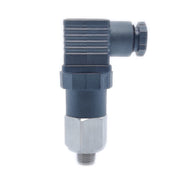As the economy has been increasing rapidly in recent years, the chemical industry is currently in a period of growth and development. With the chemical industry becoming more standardized and intelligent, the corresponding chemical sensors are playing an increasingly important role in the chemical industry.
- Classification of pressure sensors
In the chemical industry, the commonly used chemical sensors are pressure sensors. Pressure sensors can be classified into 3 types according to different requirements: absolute pressure sensor, gauge pressure sensor and differential pressure sensor; According to the capsule fabrication structure, it can be divided into 2 types: ordinary sensor and isolated sensor. We should reasonably select the type of sensor according to environmental conditions, application conditions, installation conditions and other factors.
- Division by measurement object
In the field of pressure measurement, medium low gauge pressure sensors, medium high gauge pressure sensors, absolute pressure sensors and medium low gauge pressure single flange diaphragm sealed sensors are widely used. According to the different installation methods of measurement, sensors can be divided into 2 types: pipeline direct connection installation and impulse pipe pressure tapping installation. Under the condition of small pressure, as the direct measurement of pressure may lead to unstable fluctuations, it is more reasonable to select a differential pressure sensor when measuring the small pressure not higher than 500Pa.
- Fabricate the structure according to the capsule
The ordinary transmitter has only one measuring capsule, which can directly sense the pressure or differential pressure of the measured medium: in addition to the inner membrane of the ordinary transmitter, the isolated transmitter also has an outer capsule that can directly sense the pressure. The pressure felt by the external model is transmitted to the inner membrane through a stable liquid, so as to obtain the pressure measurement value. According to the different installation methods, the isolated transmitter can be divided into integrated direct installation type and remote installation sealed type. According to the different environmental conditions, application conditions, installation conditions and other factors, the transmitter selection has different requirements.
- Selection of sensors for several special working conditions
- High temperature working environment
Corrosive conditions generally refer to the corrosivity of environmental conditions and application conditions. If the pressure pipe is made of carbon steel or stainless steel, it is better to select ordinary differential pressure sensor. In the corrosive working environment, there are also certain requirements for the sensor materials, among which the most critical ones are the diaphragm and liquid receiving materials, flange materials and shell materials. The diaphragm and liquid receiving materials should be selected according to the different chemical characteristics of the medium. The requirements for the sensor materials vary with the concentration and temperature of the medium. Generally, the sensors connected by flanges can be made of carbon steel, 304SST and 316SST. Since flanges are not directly connected with liquid, carbon steel can be generally used in consideration of economic factors. Generally, the sensor housing is made of aluminum alloy and stainless steel. It is more economical to choose aluminum alloy in a non corrosive environment. If it is in a corrosive environment, it is more suitable to choose stainless steel.
- Conclusion
Sensors are widely used in the chemical industry. In the selection, it is necessary to specifically combine the chemical characteristics of the application environment, fully consider the comprehensive factors such as temperature, concentration and corrosivity, and then select the most reasonable sensor type to better meet the chemical production activities.



Leave a comment